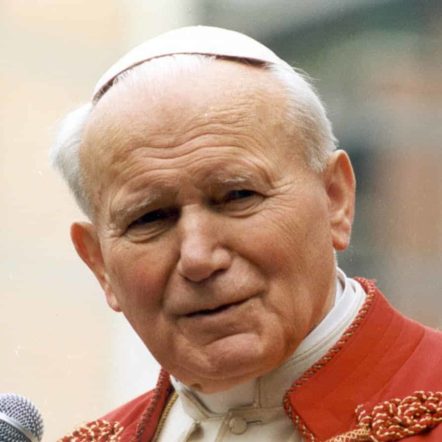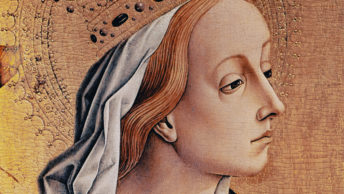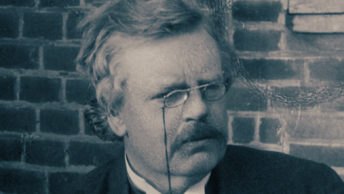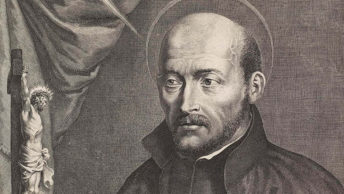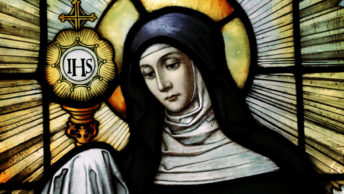St. John Paul II had one of the longest reigns as Pope in Church history; when he was elected in 1978, he became not only the first Pope from Poland, but the first non-Italian Pope in over 450 years. Most experts agree he helped change the course of history, and many believe he should rightly be called St. John Paul the Great. A few years after his election a book came out called In the Footsteps of Pope John Paul II, written by an American of Polish descent named John Szostak. The book tells the story of the author’s friendship with the Pope, whom he met when he was still a cardinal in Poland. In 1976 Karol Cardinal Wojtyla was the Archbishop of Krakow, and he and a group of Polish bishops came to the United States. Mr. Szostak helped arrange and conduct their tour, and he formed a friendship with the future Pope. He became amazed at the Cardinal’s spirituality, wisdom, and genuine concern for others—but he never dreamed that in just two years his new friend would be chosen as Pope. Neither did anyone else. Mr. Szostak tried to serve as an unofficial publicity agent, arranging interviews, photo sessions, and meeting with the Cardinal for local religious and political dignitaries, but without much success—most people weren’t interested in meeting an obscure Polish cardinal. However, when Cardinal Wojtyla was elected Pope in 1978, suddenly everyone wanted to speak with Mr. Szostak, seeking information from him on the new Pope and asking for copies of the photographs they’d rejected from him earlier. People suddenly wished they’d recognized the importance of the Polish cardinal when he’d been in their midst.
It’s easy for us to ignore others—sometimes too easy; we can be so caught up in our own activities and concerns that we miss out on the opportunity to spend time with someone truly interesting and important. It’s disappointing when we waste the chance to meet a future leader or celebrity; it’s even worse in a spiritual sense when we pass up an opportunity to experience what turns out to be a great moment of blessing or grace. There are times when Jesus comes to us in unexpected, unannounced ways. When He was presented at the Temple in Jerusalem forty days after His birth, very few people recognized the significance of what was happening—but those who did were truly blessed. Jesus comes to us at various times and in various ways, and it’s up to us to recognize and welcome Him.
The Gospel of Luke (2:22-40) shows that the infant Jesus fulfilled the prophecy contained in the Book of Malachi (3:1-4): “suddenly there will come to the temple the Lord Whom you seek, and the messenger of the covenant Whom you desire.” The purpose of His coming to earth, as the Letter to the Hebrews (2:14-18) states, was to free His people from the power of sin and death. The Temple was the site of religious sacrifices, offered by the high priest. When Jesus’ parents took Him there forty days after His birth, in obedience to the Law of Moses, this symbolized or foreshadowed the truth that He Himself would be the ultimate high priest, offering His own life as the perfect sacrifice for sins. This wonderfully important moment of grace was recognized by only a few people. Their reaction, however, was very devoted and intense—and it can teach us something important about our own recognition of and response to the Lord. Looking at the three different but related responses to Jesus mentioned in the Gospel provides us with guidance for our own spiritual lives.
First of all, in Simeon we see an attitude of rejoicing. This devout and prayerful man had been waiting to see Christ, the promised Savior, for many years, and was delighted when that opportunity finally came. We too are offered a vision of Christ—in the persons around us, and in the events of life—and this vision should make us glad. Certainly there are times in life when we’re sad or worried, but in general we should try to be happy—and if we’re not, that may be a sign that our relationship with God isn’t everything He wants it to be. Joy is a sign of trust in God, and a joyful heart is one open to His presence.
A second attitude illustrated in the Gospel is that of awe or wonder. Mary and Joseph marveled at what Simeon said about Jesus. (Imagine how you’d feel if a stranger came up and stated that your child was to be a light to the nations.) Some amazing things happened in the first forty days of Jesus’ life—and Joseph and especially Mary reflected on these events in a spirit of wonder and gratitude. We too should reflect on God’s presence in our lives in the same spirit. If only we stop to think about it, we realize that God has done some wonderful things for us. Thus, we need some quiet time for prayer each day, and perhaps even an occasional retreat or spiritual break, in order to be aware of the Lord’s presence. He comes to us in wondrous ways; it’s a shame if we’re so busy we fail to realize or enjoy this.
The prophetess Anna illustrates a third attitude: grateful proclamation. Anna arrived when Simeon was talking to Mary and Joseph; she saw what was going on, thanked God for the chance to see Jesus, and then talked about the child to all her friends and acquaintances. We too have much to be thankful for, particularly the ways Jesus comes to us—in Holy Communion, in the presence of our community gathered here for prayer, in Sacred Scripture, in the wise and caring words of a friend or relative, and in our quiet moments. We must be grateful for these gifts and, instead of keeping them to ourselves, we must share them with others. We proclaim our faith through our example and through our efforts to see and respond to Christ’s presence in others.
It’s a sad thing when we waste our chance to spend time with someone important because of our failure to recognize him, as so many people did when Cardinal Wojtyla visited the United States two years before becoming Pope. It must not be that way with Jesus. We are called to recognize His presence in the events of life and in the people around us, and then to respond to Him by rejoicing in His presence, by marveling at what He has done, and by proclaiming His love to others. On this Feast of the Presentation of the Lord, let us recall that Jesus is presented to us and that we, through our example of genuine faith and love, must in turn present Him to the world around us.

